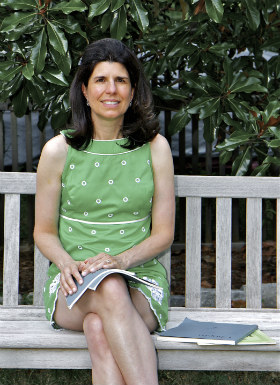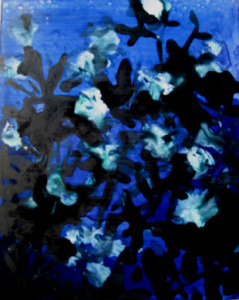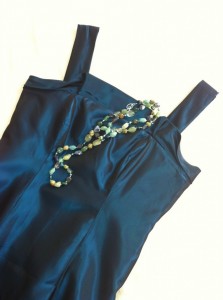Over the years of playing the piano in public, I’ve passed through many stages of performance anxiety. Perhaps the most difficult time was early on, when I expressed my stage fright through visible physical reactions. I will never forget my adult piano recital of Debussy’s Rêverie, in particular, my clacking shoe.
On a program of children ranging from kindergarteners to a few high-schoolers, I was the only adult. The setting was intimate, at a student’s home, with couches and chairs clustered around the grand piano. A third-grader named Brian scanned the program. “Who’s Nancy Williams?” he yelled out.
My son pointed in my direction. “That’s my mom.”
I waved. Brian shook his head, as if to say, oh right, the adult student. My husband and I glanced at each other, then burst out laughing.
As the recital got underway, my good mood dissipated, and a fear of playing the Rêverie with the audience hovering around the fringes of my peripheral vision crept through me. My teacher Stephen had placed me last on the program, perhaps as an accolade since he liked my interpretation of the Rêverie’s ending. I would have preferred to dispense with my performance right away. When my turn arrived, my heart thumped within my chest.
 To achieve the Rêverie’s mellifluous effects, I was to hold the soft pedal down for the entire piece. While my fingers rippled arpeggios up the keyboard, my left foot pressing the soft pedal trembled from nervousness. Slowly but inexorably, the trembling spread to my calf, then my upper leg, and all the way to my hip. By the time I was headed towards the clapping forte chords, my entire left leg shook. I managed to clamp the ball of my foot on the soft pedal, which only served to transform my ankle into a wild hinge. The heel of my flat clattered on the parquet wood floor.
To achieve the Rêverie’s mellifluous effects, I was to hold the soft pedal down for the entire piece. While my fingers rippled arpeggios up the keyboard, my left foot pressing the soft pedal trembled from nervousness. Slowly but inexorably, the trembling spread to my calf, then my upper leg, and all the way to my hip. By the time I was headed towards the clapping forte chords, my entire left leg shook. I managed to clamp the ball of my foot on the soft pedal, which only served to transform my ankle into a wild hinge. The heel of my flat clattered on the parquet wood floor.
The clacking shoe audible along with the music, I hung my head out of embarrassment, then glanced to the side, trying to telegraph a message to Stephen, what do I do now? But Stephen must have moved off to the side. I found myself staring at Brian, the third-grader. He looked startled.
I arrived at the Rêverie’s halfway mark, a solitary F, then a single, dulcet A dying away in the treble. Seizing the opportunity of these sustained notes, I leaned down, removed my left flat, tossed it aside, and resumed the music.
The cool soft pedal consoled my bare toes, as at home, where I practiced in my bare feet. By the time I reached the third section’s end, the shaking in my leg had subsided. Yet I grimaced with disappointment: this performance was falling far short of my hopes.
I pressed my lips in concentration: here was the ending that I loved. Whenever I practiced the music at home, I felt as though I could not get enough of the Rêverie’s ending. Small chords floated upwards, becoming more crystalline in tone, while underneath, single notes strode slowly but decisively down the keyboard, traversing the distance of a sixth, from A to G, a quick stride from F to E, a pause, then from D to middle C. The sound of those notes struck and purified something inside me.
Now at the recital, I rang the A, followed by the remaining tones. In the nether bass region, my fingers stirred an arpeggio, which bloomed up the keyboard, then settled into a silvery-soft F-major chord.
Amidst the clapping, from a couch directly opposite the piano, a student’s grandmother sprung to her feet. I could feel my mouth gape open in surprise at the standing ovation. I grinned. Before I took my bow, I found my left shoe to the side of the piano and placed it back on my foot. Brian’s mother approached me with shining eyes. “Oh, Nancy,” she said, “your fingers were like butter on the keys.”
I felt simultaneously sheepish and exhilarated by that recital. What I did not understand was that the details of my playing—the notes I had missed, the ending I had nailed, even the embarrassment of my clacking shoe—mattered far less than the fact that I had simply done it. Over time, after many more performances, I learned that an audience tends to overlook small mistakes, even a distraction as disrupting as a tapping shoe, as long as the music moves them. In the end, we perform as pianists to offer others the sensations and feelings—anger or disbelief; joy or wonder—from our own immersion in the music.





Lovely article! Thank you for sharing your feelings of your experience~ I’m going to send this to a few of my adult students who I know will relate!!
Thank you for your comment, and I hope your students will enjoy the article too!